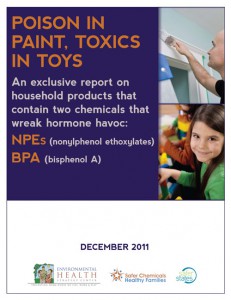
For the first time more than 650 brand name household products that contain one of two toxic chemicals of high concern, NPEs (nonylphenol ethoxylates) and BPA (bisphenol A), have been publicly identified. Twenty-five manufacturers reported their use of NPEs and BPA in consumer products sold in Maine under a 2008 state law on chemical safety.
State chemical policies are a proven, effective means for gathering previously unavailable information on chemicals used in everyday products. Most manufacturers reported NPEs in household paints (291 products) and BPA in plastic toys (280 products). NPEs were also reported in 61 other home maintenance products (such as cleaners and wood stains) and 14 personal care products (i.e. antiseptic iodine solution and hair care products). For speci!c brand name product results, visit www.HealthyStff.org.
Studies have shown that BPA and NPEs mimic the sex hormone estrogen. BPA harms brain development, behavior and the prostate gland, among many other adverse health e”ects. NPEs are highly toxic to aquatic life, degrade into a long-lived chemical that builds up in the food chain, and may harm reproduction and development in humans. Aggregate exposure to BPA and NPEs from all sources threatens the health of children, workers and the environment.
New information on chemical use in household products will improve decisions to protect family health and the environment. Government agencies and manufacturers can decide to study exposure, search for safer alternatives or phase out use of the chemical. Consumers and retailers can avoid chemicals of high concern when they purchase everyday products.
Some companies are apparently not reporting chemical use as required by Maine law. For example, manufacturers failed to report BPA use in baby food in the lining of the metal lids of glass jars. Other companies have already switched to safer alternatives. For example, most manufacturers have recently ended BPA use in infant formula can linings.
This report reveals a badly broken federal safety system that still allows the widespread use of toxic chemicals in consumer products. To protect public health and ensure product safety, Congress should pass the Safe Chemicals Act of 2011 to overhaul the Toxic Substances Control Act (TSCA), which has never received a major update in 35 years.


